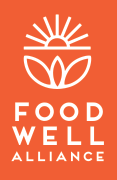Building Consensus at "We Are Farmers"
/More than 75 farmers and organizations that support farmers joined Food Well Alliance on Thursday, October 13 for a community-based conversation and fellowship over a meal of locally produced food called “We Are Farmers”. Gatherings like this help us to unearth critical information that shapes our activities and gives the roots of Atlanta’s Local Food Movement a voice in where we allocate time and money to solve the hard issues.
Bobbi de Winter, Food Well Alliance’s executive director, kicked off the evening by communicating why these convenings are so important and how they tie to our mission. “Learning tables, like this one, bring the community together to build consensus,” said de Winter, “provide an opportunity to connect better with organizations vital for pulling resources to support our local food movement.”
She explained that Food Well Alliance shares a common goal with other members of the movement to unite Atlanta’s local food system, ultimately to provide equitable access to sustainably grown locally produced foods for our communities. We serve to bring all of the players together to transform ideas into reality and stitch together each piece of this movement, which is rooted in our farmers.
Key learnings from "We Are Farmers"
Resource Constraints — for many farmers, time, money and qualified workers are often limited, impacting their ability to scale up
Marketing and Communications — often farmers do not have full-time staff devoted to customer and community outreach to grow their audience and demand for their production
Value Proposition — Because big box stores use the same language as smaller farmers, the message has become diluted and customers need to be educated on the value of locally grown, smaller production produce
Regulatory Requirements — It can be difficult to understand all of the requirements at various stages of scaling and due to time constraints or lack of knowledge, farmers are struggling to understand these limitation and requirements
Scaling Down — Supporting organizations, like the UGA Extension, are perceived as offering resources for farmers who may already be operating at a larger scale, and these resources do not always seem applicable for smaller scale farming operations
Building Consensus — For supporting organizations, a lack of collaboration impedes efforts to support farmers in scaling up and providing appropriate resources to assist with this
Lack of Business Knowledge — Many of the farmers and supporting organizations who are part of the movement are small scale and don’t necessarily have the expertise or bandwidth to understand how to scale up
From past convenings Food Well Alliance has learned a lot about the common issues facing farmers and others in the movement. These learnings inform our funding and in less than two years more than $500,000 was invested in the viability of our local farmers and their ability to serve low resourced neighborhoods as a direct result of these conversations.
These collaborative events are not just about connecting people with money. They are also about connecting farmers and others with valuable resources. Representatives from the UGA Extension program, provided opportunities for small-scale farmers to receive resources form UGA Extension.
Josh Fuder is the agent for Cherokee County. He spent time in the peace corps and has worked with local food organizations in the past. He spoke briefly to the group about some of the services offered including the following:
Soil testing
Plant identification
Insect identification
Elemental analysis of soil (like salt concentrations)
Fertilizer calculations
Forage analysis for small livestock
Diagnostic services through photographs or bringing plants to your local office
Training
More detail on these service offerings can be found on the UGA Extension website or by contacting your county agent.
Dr. Kent Wolfe is the director of UGA’s Center of Agribusiness and Economic Development and also spoke at the event about some of the other resources available for farmers. This organization produces the Farm Gate Value Report annually, which provides helpful economical and statistical information on different crops, livestock and other agricultural commodities. They also publish the Georgia County Guide. Farmers and other organizations can use the data contained in this guide as reference for grant writing and other activities to glean demographic information.
Dr. Wolfe also did a short demo of MarketMaker, a national network that connects farmers and other producers with food retailers, restaurants and others. It has some really good data mining tools to help identify your specific products, growing methods, etc. It also allows you to conduct some basic research related to your local markets.
To conclude this event, Molly Riordan, a program associate in Urban Agriculture Development at Cornell University, led us in a collaborative discussion exercise targeted at gathering information on common challenges in scaling and marketing. In a pre-event survey, 70 percent of respondents told us their biggest concern was around scaling up and growing impact of their production.
The group broke out into various tables based on role — farmers, supporting agencies, advocates — to discuss key challenges and then shared those with the rest of the group. The key learning were compiled into key learning which can be viewed in depth via the full report and one-pager.




